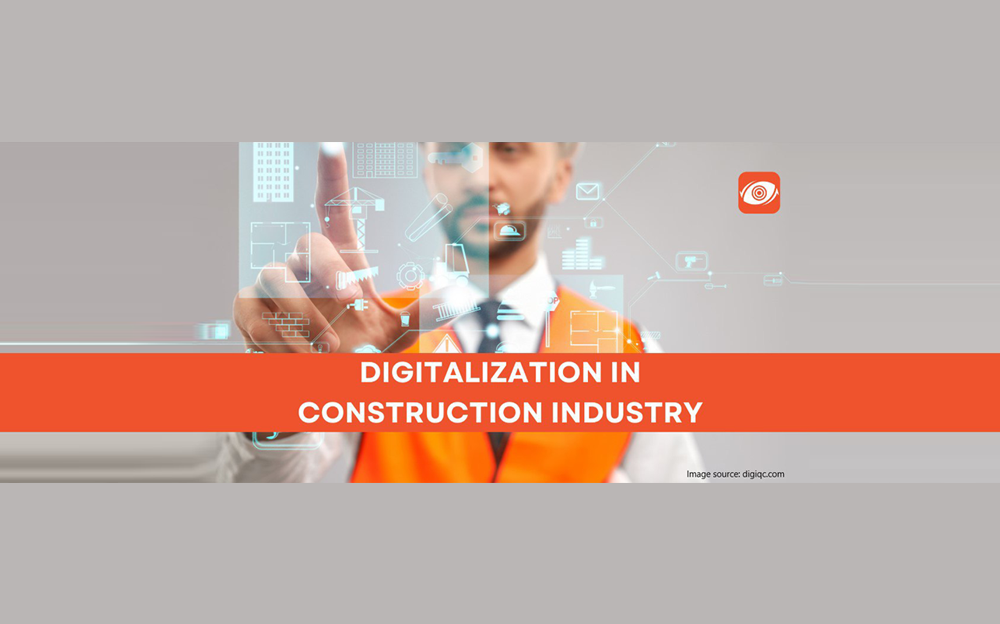
Digitization is poised to revolutionize the construction industry, bringing about profound changes that enhance efficiency, safety, sustainability, and overall project management. As digital technologies become more integrated and advanced, their impact on construction is becoming increasingly significant. Companies that have adopted digital innovations are reporting significant improvements, with studies indicating a 34 per cent higher performance compared to those that have not embraced these advancements. Here’s an in-depth look at how digitization is shaping the construction industry.
Enhanced Design and Planning
The design and planning stages of construction are undergoing significant transformation due to advanced digital tools like Building Information Modelling (BIM) and artificial intelligence (AI).
- Building Information Modelling (BIM): BIM has evolved into a comprehensive tool that integrates 5D aspects, incorporating time and cost along with the traditional 3D models. This allows for more precise planning and budgeting, reducing the likelihood of cost overruns and project delays.
- AI-Driven Design: AI algorithms are now capable of generating optimized designs based on a variety of parameters, including material costs, environmental impact, and structural integrity. This results in more efficient and sustainable buildings. AI also assists in identifying potential design flaws early in the planning stages, mitigating risks and ensuring higher-quality outcomes.
- Augmented Reality (AR) and Virtual Reality (VR): AR and VR technologies have become standard tools in the design process. These technologies enable stakeholders to visualize projects in a fully immersive environment before construction begins, allowing for more accurate and collaborative planning.
Streamlined Construction Processes
Digital technologies are streamlining construction processes, making them more efficient and less reliant on manual labour.
- Robotics and Automation: Robotics have become more sophisticated, and capable of performing complex tasks such as bricklaying, concrete pouring, and even assembling prefabricated components.
- 3D Printing: The use of 3D printing in construction has expanded, allowing for the creation of entire building components, including walls and structural elements, directly on-site. This technology reduces material waste and construction time, contributing to more sustainable building practices.
- Drones: Drones are now ubiquitous on construction sites, used for everything from site surveys to real-time monitoring of progress.
Improved Project Management
Project management has been revolutionized by digital tools, making it more efficient, transparent, and data-driven.
- Project Management Software:Advanced project management software integrates all aspects of construction projects, from scheduling and budgeting to resource allocation and risk management. These platforms provide real-time updates and analytics, allowing project managers to make informed decisions swiftly.
- Blockchain Technology: Blockchain technology ensures transparency and security in project management. Smart contracts automate and enforce contractual agreements, reducing the risk of disputes and ensuring timely payments. Blockchain also provides a tamper-proof record of project activities, enhancing accountability.
- Data Analytics and Predictive Insights: Data analytics tools analyze vast amounts of data to provide predictive insights, helping project managers foresee potential issues and mitigate risks. Predictive maintenance, for instance, can anticipate equipment failures and schedule timely repairs, reducing downtime.
Enhanced Safety and Sustainability
Safety and sustainability are critical concerns that digitization is addressing effectively.
- Wearable Technology: Wearable devices such as smart helmets and vests monitor workers’ health and safety in real time. These devices can detect fatigue, heat stress, and hazardous conditions, alerting workers and supervisors to take preventive action.
- Sustainable Building Practices: Digital tools enable the design and construction of more energy-efficient buildings. BIM allows for the simulation of energy performance and environmental impact, helping architects create designs that minimize energy consumption and carbon footprint.
- Waste Reduction: Technologies like 3D printing and prefabrication produce components with precise specifications, reducing material waste. This not only lowers costs but also lessens the environmental impact of construction activities.
The integration of advanced technologies such as BIM, AI, robotics, drones, and data analytics is paving the way for a more efficient, transparent, and sustainable industry. As these technologies continue to evolve, their impact on the construction industry will only grow, ushering in an era of unprecedented innovation and growth. Embracing digitization is not just a competitive advantage but a necessity for construction firms aiming to thrive in the future.
Draftech – Your Project, Our Expertise.
Testimonials
Thank you for all your efforts on our projects; they have been an invaluable contribution to their success. We look forward to working with you on future projects.
Ian Ferguson MPM Group
Jess and Karl at Draftech were amazing. The communication from the start was prompt, and the entire process was extremely easy. We needed their knowledge on Air Schematics, and they had made one up for our buildings that we service. Thanks so much, and we will be using you guys in the future. Cheers, Air Control Australia.
Greg Colebrook AirControl Australia
With Draftech’s thorough understanding of building services modelling and close attention to detail, Forth has been afforded the opportunity to outsource some of our BIM projects with absolute confidence in the accuracy of the final product.
Gary Murdoch Forth Consulting
Very professional and efficient organization. Delivered a great product to a tight deadline.
ACE Power
Karl and the team are very professional and have a vast knowledge of BIM coordination.
Dwayne Willaims Babinda Electrics
We had multiple large projects with tight deadlines and needed a company we could trust. The teams delivery, attention to detail and understanding of what is being designed is always executed to a high standard.
Martin O’Donovan Envar Engineers
Draftech offered a flexible and reliable approach to working collaboratively with our team. They met our expectations and quality requirements and also offered up new ideas.
Draftech have proven to be a valuable and trustworthy resource and we will continue to work with Draftech on other projects.
Simon Marsden Umow Lai
Draftech is different from others in the professionalism and features they provide.
The ability to walk through projects in real time online provides invaluable insight into problem areas and helps provide an efficient resolution on the spot without many phone calls, emails and the necessity for us to paw through countless drawings to understand the issues.
Todd Morris Manager - Air mech
Draftech were put forward to FIP Electrical as the solution to Coordinate, Model, carry out clash detection, provide Electrical Services Shop Drawings, as built documentation and completed electrical model.
Simon Thorpe FIP Electrical
In close collaboration Draftech set up all our systems and model deliverables. In this process Draftech have proven to be a valuable resource for us and demonstrated commitment, understanding and professionalism.
David Skelley DJCoalition
Draftech’s attention to detail and proactive nature throughout the project assisted us in identifying issues before becoming evident on site, saving us both time and unexpected costs.
Matt Payne PJM Engineering Services
They delivered very high quality Revit models and associated 2D documentation at key milestones, working to a tight budget and in strict accordance with the Architects’ BIM requirements.
Peter Thomas Geoff Hesford
We found Draftech’s work to be of high standard and the team delivered exactly as agreed, in fact, when we considered the project complete, Draftech put further resources into the project as they were not satisfied.
John Johnson Beca
Engaging Draftech during design gave us the tools to make smart decisions.
Hansen Yuncken Design Manager - Michael Harkins
The drafting service is timely, reliable and fit for purpose for the built environment.
Peter Harvey Harvey Industries
Draftech stands apart from other drafting services that we have previously used in their attention to detail and ability to adapt to the individual client’s requirements.
Doug Holt McCaig Aircon
I can confidently recommend Draftech as a solid and reliable supplier, and experts in their field. I look forward to working with them again in the near future.
Chris Behan Norman Disney & Young
After seeing the benefits Draftech provided us on the Townsville Hospital Redevelopment we have set up a relationship with Draftech and intend to continue to use their BIM knowledge and skills for our future projects.
Brad Lund Energy Power Systems
Draftech has no competition as they are in a class of their own.
John Boyes Babinda Electrics
Draftech Developments Drafting and Design Capabilities, in conjunction with their outstanding level of Client service and support has provided great solutions to our engineering and Drafting Design portions within our Gorgon Barrow Island Project.
Aaron Hazelton Applied Electro Systems Pty Ltd
Draftech set up necessary systems and workflows very quickly, but also setup auditable estimating and weekly cost tracking processes that we utilised, requiring little maintenance.
TOM PURDON MPM GROUP
































